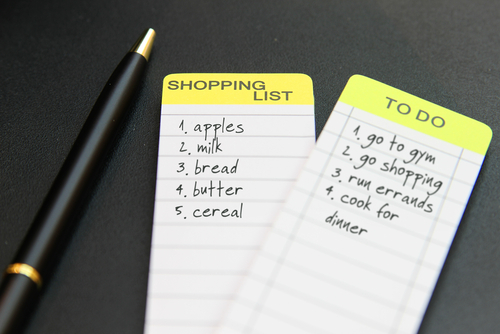What is a List?¶
A list holds items in order. A list in Python is enclosed in [ and
] and can have values separated by commas, like [1, 2, 3, 4, 5, 6, 7, 8,
9, 10]. You probably use lists all the time. People often make a list
before they go shopping or a list of things to do. A list has an order and
each list item has a position in the list, like the first item in a list or the
last item in a list.
When you ran the code in the last section, did you get 55? That’s the sum of all the numbers from 1 to 10. Here is the program again. Run it if you don’t remember what it printed before.
-
csp-7-3-1: Now, change the program above to get the product instead of the sum (e.g., replace + with *, and replace the 0 as the initial value of sum to 1). What do you get now when you run the program?
- 55
- That's the sum
- 0
- That's what you get if you leave the sum as 0. Multipying everything by 0 gets you 0
- 3628800
- That's 1*2*3*4*5*6*7*8*9*10
- Error - number is too big
- It should actually work
Note
Once you change the program above in order to use * instead of +,
you will see that it is still using the name (variable) sum to
represent the product of all the numbers in things_to_add. The
program would be better if we used the right name for the variable:
product instead of sum once we switched to multiplication (*)
from addition (+). However, the program still works. In the end,
the names for the variables are there for the benefit of the humans, not
the computer. The computer doesn’t care if we name the variable
xyzzy1776. It will work with a bad variable name. It’s just not as
readable. You should write your programs so that people can understand
them, not just computers.
Using Better Variable Names¶
Let’s write that program again with a better variable name. We will use
product instead of sum for the variable name that holds the result of
the calculation. Step through the code below by clicking on the Forward
button and note what value the variable number is set to each time through
the loop. Also note how the variable product changes during the loop.
(Numbers_Product)
-
csp-7-3-2: What is the value of number the 3rd time through the loop?
- 1
- That's the value the first time through the loop
- 2
- That's the value the second time through the loop
- 3
- That's the value the third time through the loop
- 4
- That's the value the fourth time through the loop
- 10
- That's the value the last time through the loop
-
csp-7-3-3: What is the value of product after the 4th time through the loop?
- 6
- That's the value after the 3rd time through the loop.
- 10
- That's the value if we were adding up the values rather than multiplying them.
- 24
- That's the value after the 4th time through the loop.
- 120
- That's the value after the 5th time through the loop.
csp-7-3-5: csp-7-3-4: The following program calculates the average of a list of numbers, but the
code is mixed up. First initialize the sum to 0. Then create the list of
numbers. Loop through the list and each time add the current number to the
sum. Print the sum divided by the number of items in the list. Don't
forget that you must indent the lines that are repeated in the loop.sum = 0
numbers = [90, 80, 75, 90, 83]
for number in numbers:
sum = sum + number
print(sum / 5)
